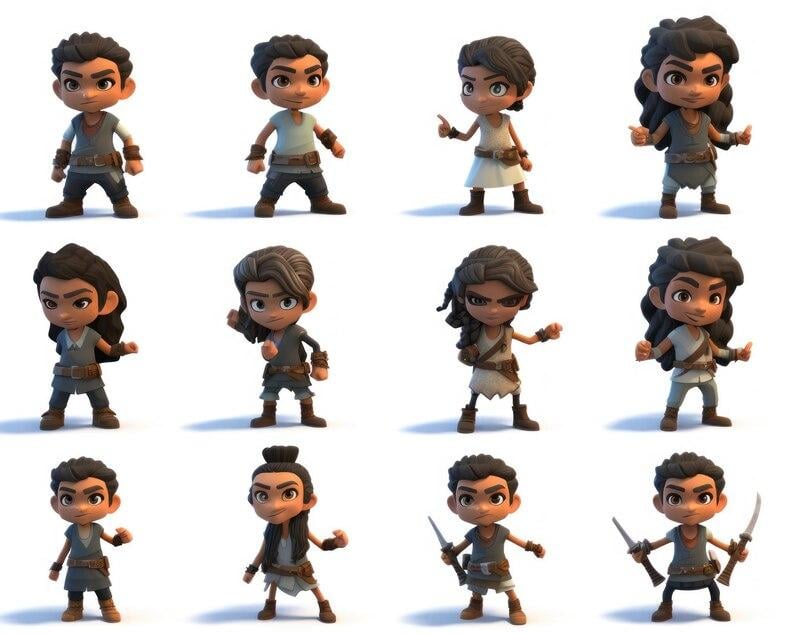Tips for Creating Engaging Characters in Animation

Creating engaging characters is essential for any animation to connect with its audience. Characters breathe life into stories, making them memorable and emotionally impactful. Whether you’re designing for a short animation, a series, or an animation studio in New York, your characters should feel real and relatable. Here are some practical, humanized tips for crafting animated characters that leave a lasting impression.
1. Start with Who They Are
Every character should have a core identity. Think about their personality, goals, and the challenges they face. Ask yourself:
-
Who is this character at their heart?
-
What are their quirks, fears, and dreams?
A character isn’t just a design; they’re a personality that audiences can connect with. Give them traits that make them feel like someone you’d meet in real life.
2. Make Them Relatable
Relatability is the bridge between the audience and your character. They don’t have to be perfect; in fact, flaws make them more human.
-
Is your character trying to overcome self-doubt?
-
Do they have a habit that makes them unique, like nervously biting their lip or always humming?
Small, real-life details bring characters closer to the viewer’s heart.
3. Show Their Emotions
Emotion drives connection. Whether it’s happiness, sadness, anger, or fear, make sure your character’s emotions come across clearly. Use:
-
Expressive facial features (big smiles, subtle frowns, wide eyes).
-
Body language that matches their mood (slumped shoulders, a confident stance).
When your character feels something, your audience should feel it too.
4. Give Them a Purpose
Every character should have a reason to exist in the story. Are they a hero, a helper, or a troublemaker? Define their role and how it ties into the bigger picture. Characters with clear goals or motivations are more engaging and easier to root for.
5. Keep Their Design Simple
In animation, a visually simple character can still be incredibly engaging. Avoid overloading your design with unnecessary details. Focus on:
-
Distinctive features like a signature hairstyle, unique clothing, or an accessory.
-
Clean lines and shapes that make them recognizable at a glance.
Remember, simplicity helps when animating movements and expressions.
6. Add Personality to Their Movements
Movement is where animation truly shines. Each character should have a unique way of moving that reflects their personality.
-
A shy character might shuffle their feet or avoid direct eye contact.
-
A confident character might stride with their chest out and head held high.
These small details make your character feel alive.
7. Balance Strengths and Weaknesses
No one is perfect, and neither should your characters be. Give them strengths to admire and weaknesses to make them relatable.
-
A determined character might struggle with impatience.
-
A brave character might secretly fear failure.
This balance adds depth and makes them more memorable.
8. Use Colors to Tell a Story
Colors are a powerful tool in animation. Choose a palette that reflects your character’s personality.
-
Bright, bold colors can indicate energy and enthusiasm.
-
Muted tones might represent mystery or seriousness.
Stick to your brand or project’s theme, but don’t be afraid to experiment within those limits.
9. Let Them Grow
Just like people, characters should evolve. Let their experiences change them throughout the story.
-
How do they handle challenges?
-
What lessons do they learn along the way?
A character’s growth makes the story dynamic and keeps the audience engaged.
10. Think About Their Voice
A character’s voice—both literally and figuratively—is a big part of their personality.
-
Collaborate with voice actors to find the perfect match for tone and delivery.
-
Ensure their dialogue reflects who they are. A cheerful character might use light, optimistic phrases, while a serious one might be more reserved and precise.
11. Focus on Their Relationships
Characters don’t exist in isolation. How they interact with others reveals their personality.
-
A loyal friend might always put others first.
-
A mischievous character might tease or play pranks.
These dynamics add richness and make the world of your animation feel alive.
12. Make Their Journey Meaningful
Every character has a story, even if it’s not the main plot. Whether it’s overcoming a fear, achieving a dream, or learning something new, their journey should feel authentic.
Think about what you want the audience to take away from your character’s arc. This helps create emotional impact.
13. Draw Inspiration from Real Life
Observe people around you. Notice their habits, expressions, and ways of speaking. Real-life details can add authenticity to your animated characters, making them feel less like a drawing and more like a person.
14. Test and Refine
Share your character designs and animations with others to get feedback. Sometimes a small tweak, like adjusting an expression or changing a movement, can make a big difference in how a character connects with an audience.
15. Trust Your Creativity
There’s no single formula for creating the perfect character. Let your creativity shine and trust your instincts. If you believe in your character, chances are your audience will too.
Engaging characters are the foundation of compelling animation. By focusing on relatable traits, expressive design, and meaningful storytelling, you can create characters that resonate with audiences and bring your animation to life. With a little thought and care, your characters can leave a lasting impression, making your animation unforgettable.
- Art
- Causes
- Crafts
- Dance
- Drinks
- Film
- Fitness
- Food
- Games
- Gardening
- Health
- Home
- Literature
- Music
- Networking
- Other
- Party
- Religion
- Shopping
- Sports
- Theater
- Wellness


